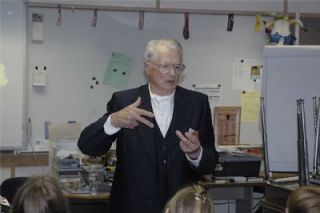MARYSVILLE Having lived in a couple of spots in Europe and in Canada, and most importantly, having lived through arguably the darkest times of the 20th Century, Vwladyslaw Poradas initial message was one of praise for his adopted home.
Im going to tell you this is the best country in the world, Porada told teacher Jerry McGahas fifth-grade Hi-Cap class at Pinewood Elementary on June 11.
Porada was a guest at the school via his connection to another Pinewood teacher, Kelli Sparks. McGaha had his class greet their visitor in Polish and presented him with a bouquet of flowers.
Born in Poland, Porada was a teenager when World War II erupted and he found his native country invaded by Nazi Germany. His brother had been a member of the Polish army who became a German POW. The brother escaped and returned to Poland, but the German authorities found him and the result was the arrest not only of the brother, but essentially Poradas entire family, including Porada himself.
Following that arrest, Porada said he vividly remembers being herded along with hundreds of others onto one of numerous waiting trains, trains headed for either work camps or death camps. Nazi soldiers decided on the spot who went where. While Porada ended up in a work camp, his brother was sent to the infamous Auschwitz concentration camp and did not survive.
The work camp where Porada spent four years was a farming operation and Porada said the prisoners there worked from about 5 a.m. to late into the evening, seven days a week.
It was hard work, he said, even though he was familiar with farming from his childhood.
We had no rights, Porada said. Those who did not work hard enough were beaten or killed. Porada referred several times to workers lives ending in the fire place. He himself was beaten seven times, he said.
Porada described the living conditions as predictably horrendous. He shared a small living space with seven other Europeans with whom he could not really even communicate since he did not speak their languages. Clothing was sparse and Porada said the prisoners did without socks, underwear or coats despite the often cold conditions.
In a bit of irony, a romance and a lifelong marriage grew out of Poradas time in Germany. In the course of his imprisonment, he met a young woman who knew nothing about farming and greatly feared for her life. Porada made it his business to help her as best he could. After the war, that young woman, Anna, became Poradas wife and the two have been married for 64 years.
While Porada has many memories of life in the work camp, one of the bloodiest moments arrived just three days before the camp and its occupants were freed by American troops. According to Porada, the German Gestapo simply lined up and shot some 1,200 workers, dumping the bodies in a mass grave. Porada remembers some of the victims were clinging to life, but trapped in that grave when the Americans arrived.
Porada had nothing but praise for the American soldiers who provided the former prisoners with everything from food to medicine and clothing.
We never forgot, he said. Thats why we came to this country.
Once the war ended, Porada said he did not return to his native Poland because of the Russian Communist occupation of that country. A Catholic, Porada feared if he returned to Poland, he might end up in yet another detention camp. Instead, he joined the U.S. Army as a displaced person.
Eventually, while it took a while, he, his wife and their children made their way here. Porada said he had two American dollars to his name and spoke little English when he arrived. Friends helped him gain a job in a slaughterhouse in the Seattle area and he worked for that company for 29 years. At the same time, he invested in real estate and said he now lives more than comfortably. He clearly did not want the message of his having gone from possessing virtually nothing to becoming a wealthy man lost on his young Pinewood audience.
I thought it was really cool to hear some of his stories, said Sage Fairbanks, 11.
When he was telling his stories, I felt like he was really there, added Madison Kint, also 11.
Former Nazi prisoner tells students to be thankful for their freedom
MARYSVILLE Having lived in a couple of spots in Europe and in Canada, and most importantly, having lived through arguably the darkest times of the 20th Century, Vwladyslaw Poradas initial message was one of praise for his adopted home.



